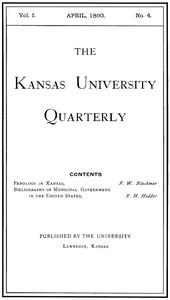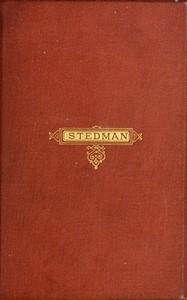|
|
Read this ebook for free! No credit card needed, absolutely nothing to pay.Words: 24813 in 6 pages
This is an ebook sharing website. You can read the uploaded ebooks for free here. No credit cards needed, nothing to pay. If you want to own a digital copy of the ebook, or want to read offline with your favorite ebook-reader, then you can choose to buy and download the ebook.

: The Kansas University Quarterly by Various Kellogg Vernon L Vernon Lyman Editor - Science Periodicals; Natural history Periodicals@FreeBooksThu 08 Jun, 2023 COMMITTEE OF PUBLICATION. JOURNAL PUBLISHING HOUSE LAWRENCE, KANSAS 1893 KANSAS UNIVERSITY QUARTERLY. PENOLOGY IN KANSAS. BY F. W. BLACKMAR. The Kansas State Penitentiary at Lansing has been noted as one of the best prisons in the far west. And indeed in some particular features it is quite remarkable. Among its especially good qualities, as compared with other prisons of similar nature, are its financial and economic management and its thorough discipline. Its financial management shows it to be practically a self-supporting institution. The institution has been fortunate in securing good management and in the utilization of the labor of the prisoners, by means of the contract system of labor, as well as in performing nearly all of the work in connection with repairs, improvements, etc. But especially has it been fortunate in its location immediately above a rich vein of coal, so that a shaft could be sunk within the prison walls for the working of the mine. The mine has thus been made to yield a handsome income for the benefit of the State. The running expenses of the penitentiary for the biennial period of 1891 and 1892 were 7,409.47, while the receipts from contract labor, coal sales and other sources were 5,190.35. Thus making an expenditure over and above cash receipts of ,939.94. But if it be considered, as it ought to be, that coal to the value of ,420.78 was furnished the western sufferers, and that coal to the value of ,533.68 was furnished to State institutions by the prison management, and also that ,106.46 were spent in permanent improvement, it will be seen that the income of the prison has exceeded its current expenses by a margin of over ,000 for the biennium of 1891 and '92. The total income from the coal mines for two years was 8,993.57 and the total income from contract labor in the same period was ,225.80. This is a remarkable showing for a prison containing on an average about 900 prisoners of all grades and classes. Eighth Biennial Report of Kansas State Penitentiary, p. 7. A close inspection of the prison management will convince one that a strictly military discipline prevails within the prison. It is a busy place at the penitentiary. All able-bodied men not undergoing special punishment are employed. It is not a place for idlers, for the law permits and requires service. The management of the different industries, the hospital, the library, the insane department, the kitchen and dining room all show care and system. So, also, for cell-ventilation and other forms of sanitation there is great care exercised by those in authority. While it is well to acknowledge the excellent management of the prison during the past, it is also pertinent to consider what progress may be made in the future. As there has been such great advancement in prison science in the past twenty years, it may be well to measure the Kansas penological system by ideal systems, as well as by the foremost practice in the best regulated prisons in Europe and America, to ascertain in what especial lines Kansas needs to develop her penological system. No doubt it is highly gratifying to the tax-payers of Kansas that the institution is on a self-supporting basis. Especially is this to be approved in a new state where so much must be done in a short time; where schools, churches, hospitals, asylums, and penal institutions must be built and maintained by the people almost before they have made themselves comfortable in a new country. These must be provided for, while railroads, roads, bridges and court houses must be built and the native resources be made productive for the support of all. But admitting all this, the management of prisons must consider reform as the ultimate service to be performed in all penal institutions. The new prison law of New York has admitted that reform is the ultimate end of all confinement. But it views reformation as the only radical means of protection to society. Reformation consists in "the reasonable probability that the prisoner will live and remain at liberty without violating the law." In this the law rests on the political basis of protecting society rather than upon the moral basis of converting and improving the qualities of the individual for his own sake. Much progress has been made in the past fifty years in the treatment of prisoners respecting discipline and reform. Indeed, an entirely new light has been thrown upon the subject of penology. A careful inquiry has been made into the question of what men are confined for, how they are to be managed while under confinement, and what is to be done with them after confinement. Although the fundamental principles of penology are quite well established concerning the object and nature of discipline, yet there are many questions of detail respecting the methods to be pursued in carrying out these principles of punitive and reformatory measures. In other words, the practical application of theory, in spite of all the progress that has been made, leaves serious difficulties to be met and mastered. It is generally considered by all right-thinking persons versed in prison science that the following objects of confinement are essential in every case: First, the protection of society; second, punishment of the offender; third, prevention of crime; and fourth, reform of criminals. Doubtless no theory of prison discipline may be considered complete which lacks any one of these four great fundamental principles. Yet it is true that we shall find, even at this day, one, two, and even three of these four fundamental principles violated in the practice of the imprisonment of our fellow beings. The practice of hurrying one, who does commit a crime, away from the sight and contact of his fellow beings, is indicative of a universal sentiment in modern society. Society demands at least this protection, and its request and privilege should never be denied in this respect. But the old idea of punishment for revenge has nearly died out of modern penalties of the law. There was a time when, coupled with the desire to shut one away from society, doubtless for its own protection, was a desire to take revenge upon the individual who had outraged society. Sometimes a desire for revenge precipitated an immediate punishment regardless of law and order. Sometimes it was studiously and systematically cruel in all its plans for punishment as well as in their execution. But in a large measure this has been eradicated from the spirit of our laws and institutions. We see some evidence of it in our modern process of lynching when anger and revenge seize upon people with such force as to cause them to lynch the lawbreaker in a most cruel manner. So also in respect to individuals who have committed great crimes, when the whole community seem so desirous of revenge that they have thrown their whole support into the prosecution of the offender. But these are exceptional cases. The spirit of punishment in modern times is that which looks calmly on the act of the lawbreaker as an injustice to society for which he must pay the penalty. In other words, a man is imprisoned for life or hung, not because society desires to wreak upon him vengeance on account of the crime which he has committed, but because society demands protection, and that he must be punished on account of the demand to uphold the dignity and power of the law, for law without a penalty has little force to the evil doer. The writer is much indebted to the present Warden, Hon. Geo. H. Case, and to his able assistants for their courtesy in showing him the working details of the prison. Free books android app tbrJar TBR JAR Read Free books online gutenberg More posts by @FreeBooks
: The poetical works of Edmund Clarence Stedman by Stedman Edmund Clarence - American poetry 19th century@FreeBooksThu 08 Jun, 2023
|
Terms of Use Stock Market News! © gutenberg.org.in2025 All Rights reserved.






